Promising Young Woman: Carey Mulligan film 'deeply troubling'
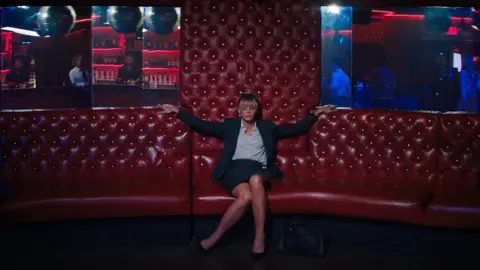 Focus Features
Focus FeaturesEvery week, 29-year-old Cassie Thomas goes to a nightclub alone and pretends to be drunk.
And she does a convincing job. She is unsteady on her feet, her eyes unfocused, her speech slurred. It usually isn't long before an apparently kind man approaches and offers to help her get home.
Except they don't take her home. More often than not, they find an excuse to take her back to their place instead, in the hope she's so drunk they'll be able to have sex with her. They ignore her comments about not feeling well or wanting to go to sleep.
It's normally when they begin taking her clothes off that their plan starts to go wrong. Suddenly, Cassie's eyes snap into focus, and the tone of the voice turns deadly. "What are you doing?" she asks.
She isn't drunk at all, and the hunter is about to become the hunted.
This is the premise of Promising Young Woman, a new film starring Carey Mulligan and directed by Emerald Fennell, and which has picked up five nominations for this year's Oscars.
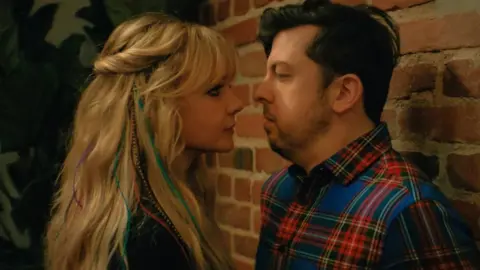 Focus Features
Focus FeaturesFennell, who was a producer and writer on the 2019 series of Killing Eve and plays Camilla Parker Bowles (now the Duchess of Cornwall) in The Crown, drew on her own experiences seeing drunk girls being taken advantage of when coming up with the concept.
"It's a huge part of hook-up culture, regrettably," she tells BBC News. "And there still isn't that much opprobrium on people who sleep with very drunk girls. It was absolutely commonplace when I was growing up, I think probably in most places it still is.
"I hope it's getting better, I still think a lot of people haven't thought about the stuff we discuss in this film very deeply, or they haven't thought about that kind of soft coercion that we often see."
Hearing the premise and watching the trailer, it would be easy to think Promising Young Woman is a feminist polemic which unfairly tarnishes all men with the same brush.
But it's a bit more complicated than that. Cassie is not presented as morally superior, and many of her own actions are reprehensible. There are also several female characters in the film who also face Cassie's wrath over their own dubious behaviour. Whether it's the college dean who didn't properly investigate an assault accusation, or the friend of a rape victim who turns a blind eye. To varying degrees, there are multiple characters, of both sexes, who are complicit.
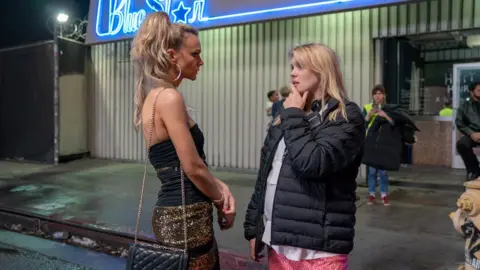 Merie Weismiller Wallace
Merie Weismiller Wallace"There have been so many people, so many women too, myself included, there are times when none of us behaved in ways we should've, were supportive enough or took things seriously enough," Fennell says.
"And for lots of men I think [the film] has been deeply troubling because they've realised that maybe there have been moments where they didn't have enough empathy to think of what the other person might be experiencing."
She adds: "I don't think it's a polemic against men, but it's a polemic against the culture that we all grew up in which tends to side with men more than it does with women."
Promising Young Woman was due to come out last spring, not long after its premiere at the Sundance Film Festival. The film was delayed due to the pandemic, but early reviews were broadly positive.
"Dramatically, it's so sharply and boldly laid out that its narrative shocks rule the day," wrote The Hollywood Reporter's Todd McCarthy. "It's jolting to witness how it refuses to let anyone off the hook."
But not everybody thought the film hit the correct notes. "This is lip-gloss misanthropy packaged as feminist manifesto, clever but not smart, cynical without being perceptive or particularly passionate," said Stephanie Zacharek of Time. "Women are angry for good reason. They also deserve better movies than this one."
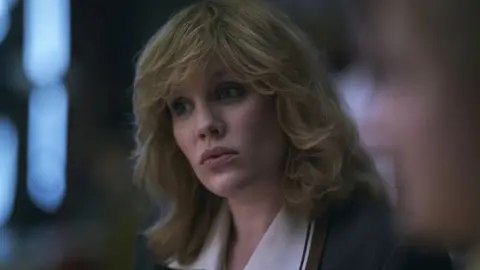 Netflix
NetflixMulligan, who shot to fame in the late 2000s after starring in An Education, says the complexity of Cassie's character was what appealed to her.
"The challenge and the fun of it for me is finding parts that I don't know what to do with, and I feel daunted by," she explains. "The more outside of my comfort zone I am, the more fun I have.
"And this definitely felt like that, I couldn't have dreamt up this part, there was so much depth to it and so much history, but there was something urgent about what [Cassie] is doing. So she's stuck, but she's also spinning, so there was so much going on, and I kind of grabbed it with both hands."
Review controversy
While the actress's performance has been praised by some, one review of the film sparked controversy after the critic questioned whether Mulligan was believable in her role. Variety's Dennis Harvey suggested she was an "odd choice", adding the film's producer Margot Robbie might have been a better fit.
Mulligan publicly objected to the review, which she said was essentially questioning whether she was "hot enough to pull off this kind of ruse". Commenting on an actress's looks felt out of step with the current climate, she argued.
Variety apologised, and Mulligan later took part in a video interview for the publication, commenting: "I was really surprised and thrilled, and happy to have received an apology. I kind of found it moving, in a way, to have drawn a line under that in a good way."
But Harvey objected to being labelled a misogynist and stood by his review, saying Mulligan had misrepresented his words. "I'm a 60-year-old gay man. I don't actually go around dwelling on the comparative hotness of young actresses," he said. He was backed up by the National Society of Film Critics.
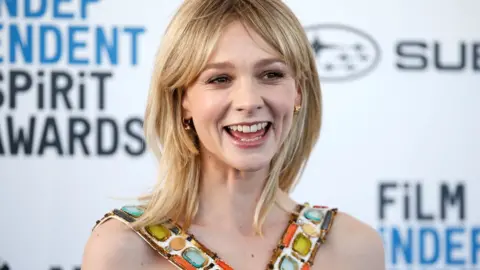 Reuters
ReutersWhen we speak in mid-January, it's clear that Fennell has serious awards season momentum. She is one of three women already being talked about for best director, along with Regina King (for One Night In Miami) and Chloé Zhao (for Nomadland).
Fennell says she's delighted just to be in the conversation. "Basically, you're talking to someone who feels like a competition winner, so to even be mentioned alongside those other directors is quite overwhelming for me and feels completely surreal," she says.
"It's thrilling that in such a terrible and strange year, there has been so much great stuff, the fact that there's so much diversity too and so many women making things, it's just really exciting. It feels like there's this whole kind of rush of newness, of exciting things that you haven't seen before, including TV - Normal People, I May Destroy You, Bridgerton, The Queen's Gambit - I mean, what a year for stories."
(Sure enough, shortly after our interview takes place, Fennell is nominated for best director at the Golden Globes alongside King and Zhao - the first time there have been three female nominees in the category. Oscar nominations followed for Zhao and Fennell earlier this month.)
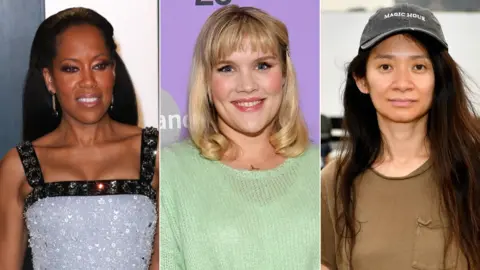 Getty Images
Getty ImagesBut glitzy awards ceremonies aside, it will be hard to ascertain how much impact the film will have. Promising Young Woman won't reach every person on the planet who needs to see it, which raises the question, how will society ever change its behaviour?
"Truthfully, it's a much bigger question than I or any one person is able to answer," Fennell says. "But if this story is a fable or an allegory, it's that you can only have forgiveness and redemption if you acknowledge what you've done.
"So often you find with apologies, when it comes to this sort of thing, that they're half-apologies and they do not take responsibility. And all Cassie is looking for is one person to say 'this is profoundly wrong, and you're right to be angry, this shouldn't have happened,' but nobody wants to because nobody wants to admit they've been part of something so dreadful."
Promising Young Woman is released on Sky Cinema and NOW on 16 April.
